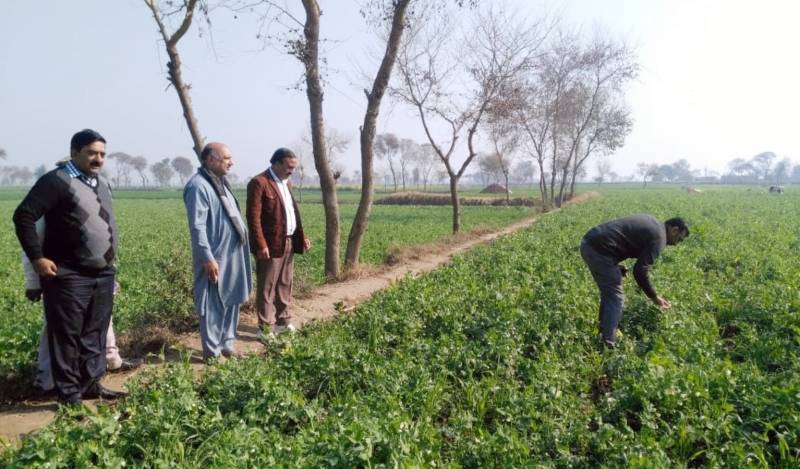UAF leads action against locusts
Experts visiting different Punjab districts to access situation and recommend mitigation measures

Stay tuned with 24 News HD Android App

The University of Agriculture Faisalabad has launched efforts to counter locust attack in plain areas of Punjab.
It has sent a team of experts and 50 entomology students to different districts of the province to analyze the situation, revealed UAF Vice Chancellor Dr Muhammad Ashraf.
It is alarming that locust, a desert insect, is attacking cultivated plains on the country, he said. The situation is worse than we faced in 1993, he added.
Dr Ashraf said that locusts have affected different crops - including mustard, onion, peas, berseem fodder, and others – but the insects have not attacked wheat crop so far this year.
Teams of UAF students are surveying locust-hit areas of Dera Ghazi Khan, Rajanpur, Muzaffargarh, Bahawalpur, Rahim Yar Khan, Sahiwal, Pakpattan, Ludhran, and Fateh Shah.
A team of experts comprising UAF faculty members is presently visiting Pakpattan and Sahiwal districts – areas that were mostly barren before being made cultivable through the irrigation system introduced by the British during the colonial period.
The team led by Entomology Department Chairman Dr Muhammad Mansoor-ul-Hassan includes Dr Sohail Ahmad, Dr Amir Rasool, Dr Waqas Wakeel, Muhammad Arshad, Dr Ahmad Nawaz, Dr Jam Nazir, and Dr Sagheer.

The VC talked to the experts through video-link. Dr Ashraf directed them to come up with viable recommendations to address the issue and guide farming community on control-and-curb strategies.
He directed the team to assess if the type of locust raiding country’s crops this year also poses a threat to wheat – the staple crop preferred by Pakistanis for major consumption.
The VC showed his concern that no scientific research has been conducted on the issue so far.
He said the university has set up a Research and Development Cell on locusts to combat the problem, which causes losses to the agriculture sector that would usually run into billions of rupees.
Dr Ashraf directed the UAF entomologists to study locust life history, growth stages, attacked areas, management techniques, critical stage for effective control measures, and effects of climate changes.
Dr Mansoor ul Hassan told the VC that they were preparing a research proposal for an in-depth study on the problem.
He said that locusts travel in swarms comprising of 30 to 50 million insects and covering as much as 150 square kilometres of area and, on average, they devour 200 tonnes of vegetation every day.
The team of experts guided the farming community in the areas they visited about the mitigation strategies.
They urged the farming community to apply the spray of lamba cyatholthrin, fipronil, bifenthrin, and chlorpyrifos in the initial stage of locust attack.
The expert said they were also collaborating with the Plant Protection Department and Agriculture Extension Department to address the problem.
